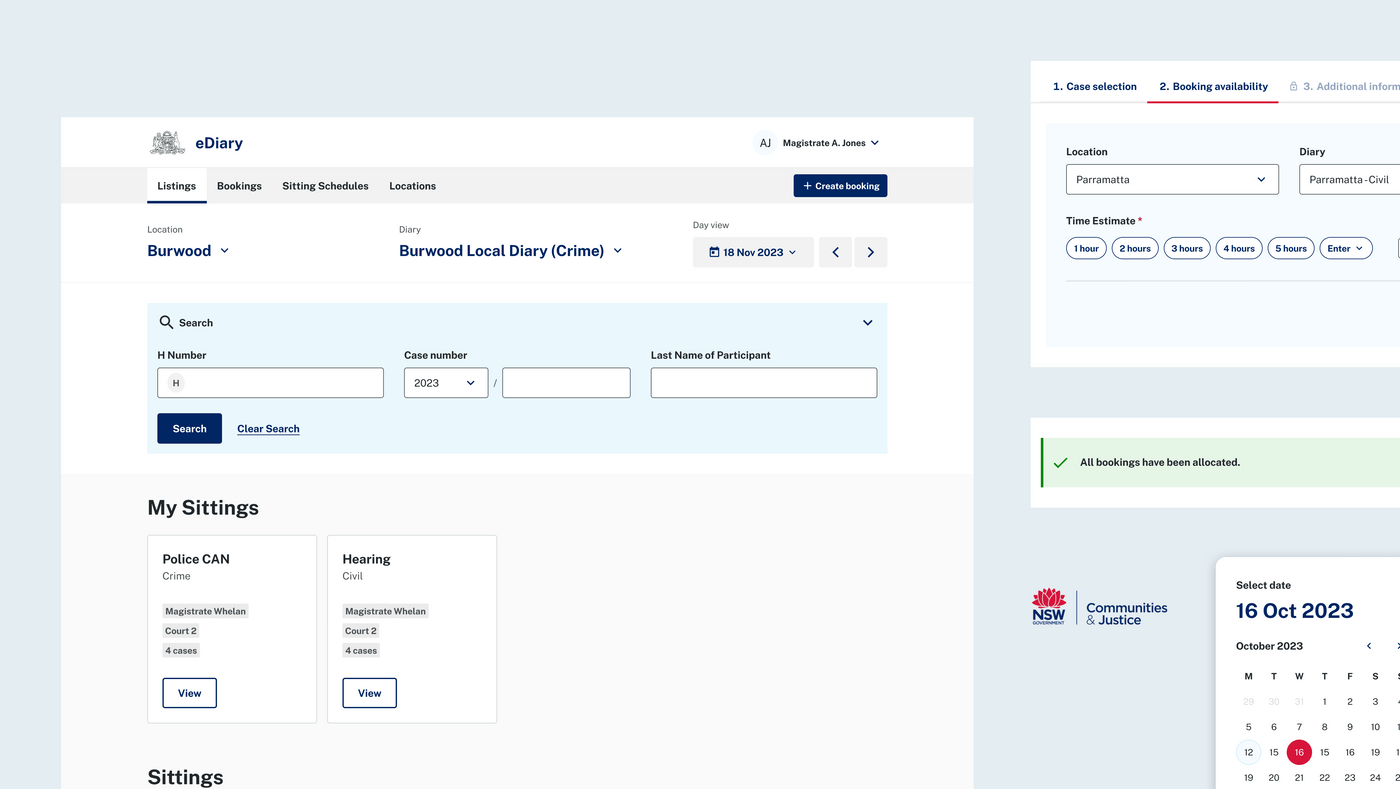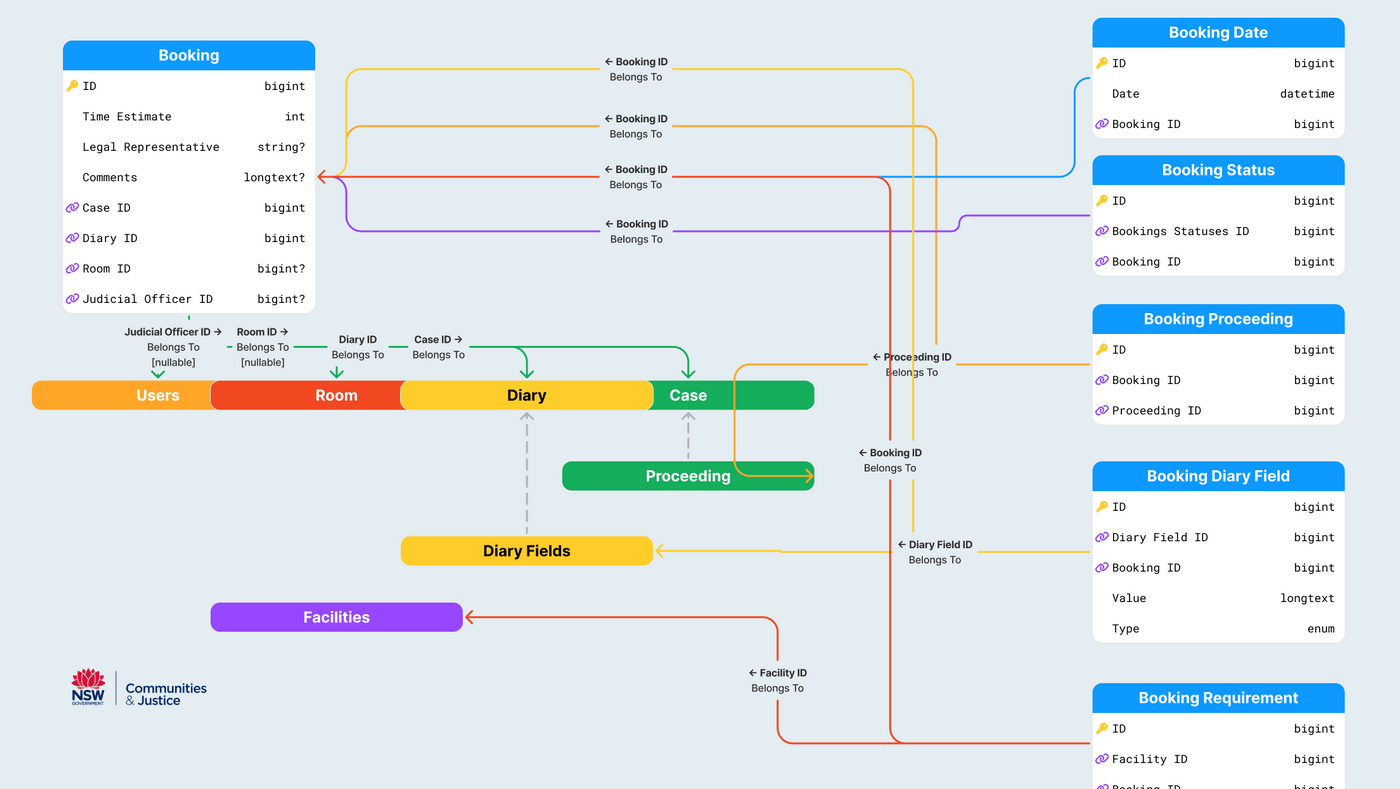The Department of Communities and Justice (DCJ) NSW faced a familiar but urgent problem: an outdated, paper-based court bookings system that was vulnerable to error, inefficiency, and disconnection from other systems.
To respond, DCJ partnered with Portable to co-develop a robust digital alternative. The brief was clear: design and build a product that would integrate with existing platforms like JusticeLink and modernise daily court operations—without disrupting them.
The opportunity
This project presented a unique set of challenges that required careful navigation and innovative solutions. Given the project’s extensive history and previous unsuccessful attempts to develop a court booking solution, it was essential to address any existing doubts and ensure stakeholders were confident in our approach. The high-profile nature of the project also meant there was significant attention and pressure to deliver a successful outcome.
With stakeholders across multiple jurisdictions and roles, Portable’s first challenge was building trust. That meant listening closely, aligning deeply, and showing—early and often—how a thoughtful design and development approach could succeed within a system shaped by decades of custom process.
Portable's hybrid team adapted our standard methodology to fit DCJ’s internal roles and rhythms. The focus: simplify entrenched workflows without compromising legal integrity or user control.

Our Approach
Given the complexity and significance of this project, it was imperative to develop a bespoke solution tailored specifically to the unique needs and challenges of the NSW Department of Communities and Justice courts. A one-size-fits-all approach would not suffice for such a critical and impactful project, necessitating a customised strategy that could address the intricacies of existing workflows and integrate seamlessly with other digital systems.
Discovery
We initiated the project with an in-depth discovery phase, focusing on gathering comprehensive requirements. Our Business Analyst worked closely with the Department’s team to deeply understand the needs of users across the courts, from magistrates to registrars. We finished this phase by iterating on the features, developing acceptance criteria ahead of moving into design.
Design
Our design phase began with detailed wireframing, to begin visualising the features and user journeys. Once refined, we translated these into high-fidelity prototypes, ensuring a clear and actionable blueprint for development.
As part of the design work, we built out the design system from the Department’s existing style guide, to ensure all components were accessible and functional.
Technology
Built on AWS using a secure, resilient architecture reviewed by DCJ Solution Architects, eDiary supports scalable deployments and rigorous uptime.
- Backend and frontend were developed with NodeJS and Typescript—NestJS on the backend, NextJS on the frontend—allowing for maintainability and use of modern open-source tools.
- Authentication was integrated with SAML via Okta, later updated to Microsoft Entra to meet policy shifts.
- Data integration with JusticeLink was achieved via APIs built atop the Department’s MuleSoft platform, supporting role-based permissions and seamless court case access.
- Reusable components were developed using the NSW Design System, allowing fast, flexible iteration in response to feedback.
- Test coverage across all layers enabled confidence in performance, accessibility, and security.
Testing
The product underwent rigorous testing, including QA, System Integration Testing (SIT), User Acceptance Testing (UAT), and Performance Testing, to guarantee its reliability and performance. Throughout the project, our adaptive and collaborative approach was key to navigating challenges and ensuring the project stayed on track.

Outcomes
The eDiary platform is now live across three NSW pilot sites, where it is already supporting faster, more accurate court bookings—and easing the administrative load on court staff.
The solution has:
- Strengthened operational resilience by replacing a vulnerable paper-based workflow.
- Laid a digital foundation that respects legacy systems while opening new doors for innovation.
- Delivered a user-informed system that feels intuitive because it was co-designed from the ground up.
DCJ’s leadership has embraced the platform, and ongoing support and maintenance ensures continuous stability post-launch. With eDiary, DCJ is setting a new benchmark in justice system transformation—proof that thoughtful, human-centred tech can make the system work better for everyone it serves.
Reflections
Working on the eDiary project was a great opportunity to design and build a new tool with a significant impact on the Courts system in NSW. The team at DCJ were great to work with, and allowed us the flexibility to implement the solution using modern and secure frameworks, resulting in a product that can be easily maintained and expanded on in future.
- Steve Joynt, Senior Developer
Team
- Becky Leonhardt, Business Director
- Andrew Fulton, Technical Lead
- Dave Allen, Technical Business Analyst
- Cristiano Fantasia, Experience Designer
- Steve Joynt, Senior Developer
- Cathy Guarino, Senior Developer
- Tam Ho, Developer
- Danielle Emond, Senior Producer
- Richard Verheyen, Senior Developer
- Victoria Houen, Production Lead